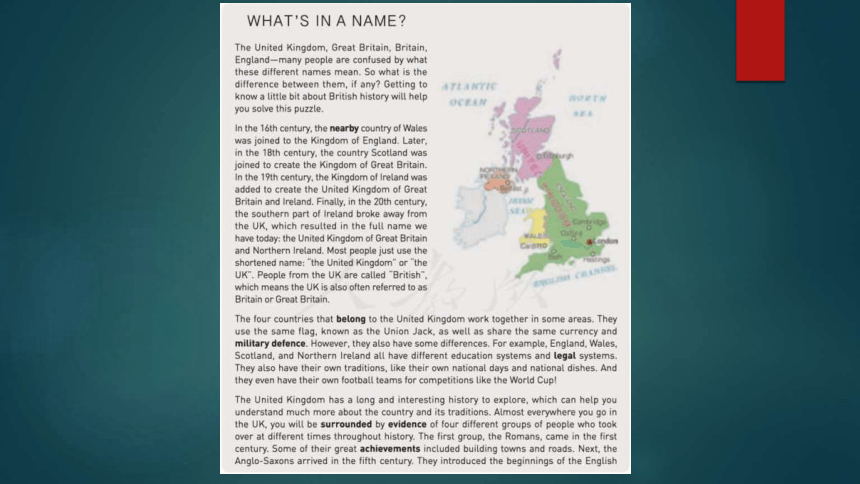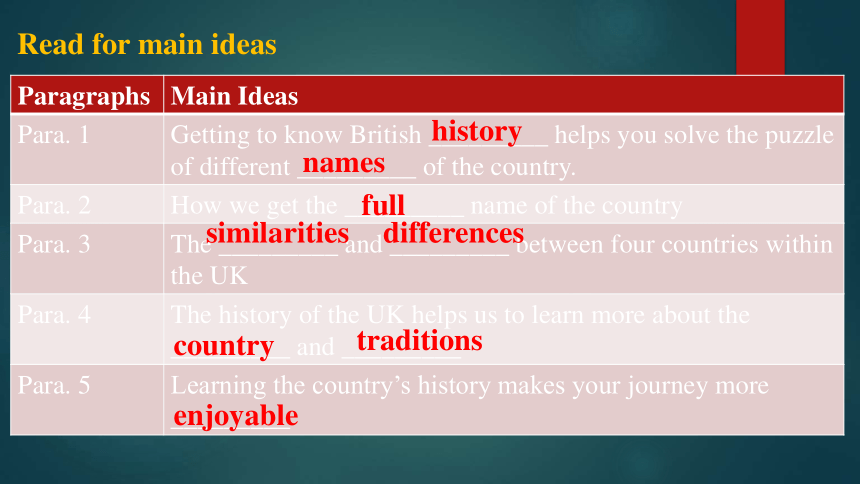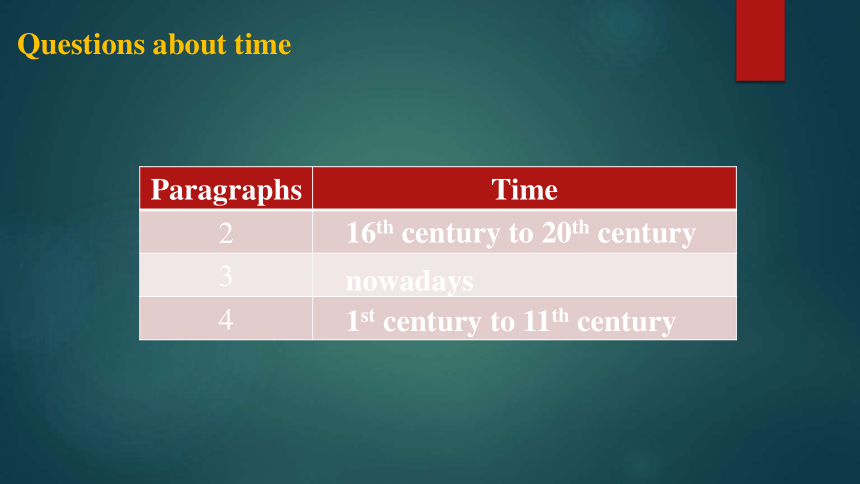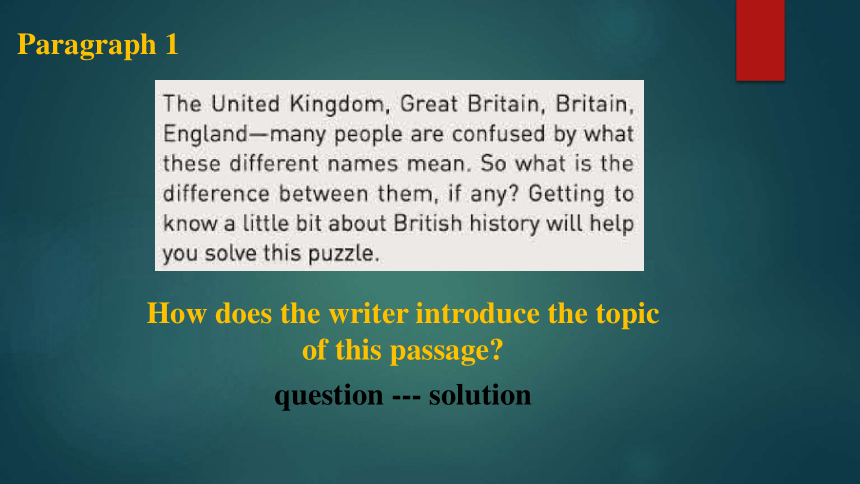人教版(2019) 必修第二册 Unit 4 History and Traditions Reading and thinking课件(21张)
文档属性
| 名称 | 人教版(2019) 必修第二册 Unit 4 History and Traditions Reading and thinking课件(21张) |  | |
| 格式 | pptx | ||
| 文件大小 | 1.5MB | ||
| 资源类型 | 教案 | ||
| 版本资源 | 人教版(2019) | ||
| 科目 | 英语 | ||
| 更新时间 | 2022-04-11 15:16:26 | ||
图片预览









文档简介
(共21张PPT)
Unit 4
Reading and Thinking
A map of the United Kingdom
Do you know any of those cities Can you tell us something you know about them
Make a prediction
What do you expect to read in the passage
Read for main ideas
Paragraphs Main Ideas
Para. 1 Getting to know British _________ helps you solve the puzzle of different _________ of the country.
Para. 2 How we get the _________ name of the country
Para. 3 The _________ and _________ between four countries within the UK
Para. 4 The history of the UK helps us to learn more about the _________ and _________
Para. 5 Learning the country’s history makes your journey more _________
history
names
full
similarities
differences
country
traditions
enjoyable
Questions about time
Paragraphs Time
2
3
4
16th century to 20th century
nowadays
1st century to 11th century
Read for structures
Part 1
Part 2
Part 3
solves confusion about names
learn country and traditions
make journey more enjoyable
Paragraph 1
How does the writer introduce the topic of this passage
question --- solution
Read Para. 2, sort out the information according to the timeline.
16th century
England
18th century
19th century
20th century
Wales
England
Scotland
England
Great Britain
Great Britain
Ireland
The United Kingdom of Great Britain and Ireland
Republic of Ireland
The United Kingdom of
Great Britain and Northern Ireland
The United Kingdom of
Great Britain and Ireland
Read Para. 3 and find out similarities and differences between four countries
similarities differences examples
flag
currency
military defence
systems
traditions
sport teams
national days; national dishes
Read Para. 4, sort out the information according to the timeline.
1st century
5th century
8th century
11th century
groups of people
changes
Romans
Anglo-Saxons
Vikings
Normans
built towns and roads
English language;
the way people built houses
new vocabulary;
names of locations
castles; legal system
French words
A timeline for British history
When What happened What changed
1st century Romans arrived built towns and roads
5th century Anglo-Saxons came English language;
the way people built houses
8th century Vikings new vocabulary;
names of locations
11th century Normans castles; legal system
French words
16th century Wales joined Kingdom of England
18th century Scotland joined Kingdom of Great Britain
19th century Ireland added United Kingdom of Great Britain and Ireland
20th century Southern Ireland broke away United Kingdom of Great Britain and Northern Ireland
Read Para. 5 and answer these questions
1. Why does the writer mention London
2.Who might be the target audience of this passage How can you see
Passage as a whole
What is the advantage / significance of studying the history of a country
1. solve confusion about name
2. learn more about the country and tradition
3. make visits more enjoyable
4. know more about the world
1st century
5th century
8th century
11th century
Romans
Anglo-Saxons
Vikings
Normans
built towns and roads
English language;
the way people built houses
new vocabulary;
names of locations
castles; legal system
French words
Heyday of Roman Empire
the decline of Roman Empire
root of Hundred Years’ War
Situation: you are a tour guide for visitors to the UK, make a brief introduction of British history in four parts:
history of four groups of ruling people;
history of how the UK get its full name
the similarities and differences between four countries nowadays
the significance of studying history
Use key words in worksheet;
DO NOT use whole sentences on the textbook
Hello, everyone
Welcome to the United Kingdom of Great Britain and Northern Ireland. It is a country with a long history …
Sample
Hello, everyone
Welcome to the United Kingdom of Great Britain and Northern Ireland. It is a country with a long history. It was once ruled by the Romans, the Anglo-Saxons, the Vikings and the Normans respectively from the 1st century to the 11th century. However, it was the joining of Wales, Scotland and Ireland, as well as the breaking away of southern Ireland that made the full name that we use today. These four countries share the same currency but also keep their traditions. Only by learning the history of the UK can we develop a deeper insight into the culture of this country.
Passage as a whole
What is in a name
history
political system
A people without the knowledge of their past history, origin and culture is like a tree without roots.
--- Marcus Garvey
Homework
Write a short passage about the history of the UK with about 150 words.
Unit 4
Reading and Thinking
A map of the United Kingdom
Do you know any of those cities Can you tell us something you know about them
Make a prediction
What do you expect to read in the passage
Read for main ideas
Paragraphs Main Ideas
Para. 1 Getting to know British _________ helps you solve the puzzle of different _________ of the country.
Para. 2 How we get the _________ name of the country
Para. 3 The _________ and _________ between four countries within the UK
Para. 4 The history of the UK helps us to learn more about the _________ and _________
Para. 5 Learning the country’s history makes your journey more _________
history
names
full
similarities
differences
country
traditions
enjoyable
Questions about time
Paragraphs Time
2
3
4
16th century to 20th century
nowadays
1st century to 11th century
Read for structures
Part 1
Part 2
Part 3
solves confusion about names
learn country and traditions
make journey more enjoyable
Paragraph 1
How does the writer introduce the topic of this passage
question --- solution
Read Para. 2, sort out the information according to the timeline.
16th century
England
18th century
19th century
20th century
Wales
England
Scotland
England
Great Britain
Great Britain
Ireland
The United Kingdom of Great Britain and Ireland
Republic of Ireland
The United Kingdom of
Great Britain and Northern Ireland
The United Kingdom of
Great Britain and Ireland
Read Para. 3 and find out similarities and differences between four countries
similarities differences examples
flag
currency
military defence
systems
traditions
sport teams
national days; national dishes
Read Para. 4, sort out the information according to the timeline.
1st century
5th century
8th century
11th century
groups of people
changes
Romans
Anglo-Saxons
Vikings
Normans
built towns and roads
English language;
the way people built houses
new vocabulary;
names of locations
castles; legal system
French words
A timeline for British history
When What happened What changed
1st century Romans arrived built towns and roads
5th century Anglo-Saxons came English language;
the way people built houses
8th century Vikings new vocabulary;
names of locations
11th century Normans castles; legal system
French words
16th century Wales joined Kingdom of England
18th century Scotland joined Kingdom of Great Britain
19th century Ireland added United Kingdom of Great Britain and Ireland
20th century Southern Ireland broke away United Kingdom of Great Britain and Northern Ireland
Read Para. 5 and answer these questions
1. Why does the writer mention London
2.Who might be the target audience of this passage How can you see
Passage as a whole
What is the advantage / significance of studying the history of a country
1. solve confusion about name
2. learn more about the country and tradition
3. make visits more enjoyable
4. know more about the world
1st century
5th century
8th century
11th century
Romans
Anglo-Saxons
Vikings
Normans
built towns and roads
English language;
the way people built houses
new vocabulary;
names of locations
castles; legal system
French words
Heyday of Roman Empire
the decline of Roman Empire
root of Hundred Years’ War
Situation: you are a tour guide for visitors to the UK, make a brief introduction of British history in four parts:
history of four groups of ruling people;
history of how the UK get its full name
the similarities and differences between four countries nowadays
the significance of studying history
Use key words in worksheet;
DO NOT use whole sentences on the textbook
Hello, everyone
Welcome to the United Kingdom of Great Britain and Northern Ireland. It is a country with a long history …
Sample
Hello, everyone
Welcome to the United Kingdom of Great Britain and Northern Ireland. It is a country with a long history. It was once ruled by the Romans, the Anglo-Saxons, the Vikings and the Normans respectively from the 1st century to the 11th century. However, it was the joining of Wales, Scotland and Ireland, as well as the breaking away of southern Ireland that made the full name that we use today. These four countries share the same currency but also keep their traditions. Only by learning the history of the UK can we develop a deeper insight into the culture of this country.
Passage as a whole
What is in a name
history
political system
A people without the knowledge of their past history, origin and culture is like a tree without roots.
--- Marcus Garvey
Homework
Write a short passage about the history of the UK with about 150 words.
